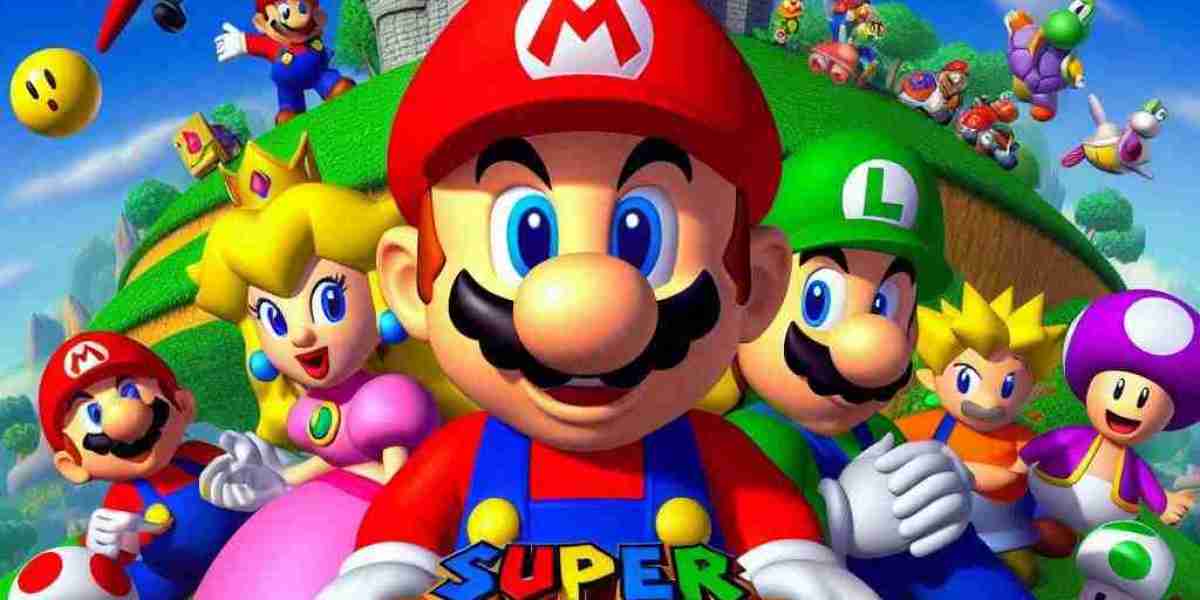The 1990s were a golden era for video games, a time when gaming evolved from simple pixels and sprites into a medium capable of delivering deep, immersive experiences. From the rise of 3D graphics to the birth of iconic franchises, the 90s gave us some of the most beloved and influential games of all time. Whether you grew up in the era or are discovering these classics for the first time, here’s a look at the top 10 90s games that defined a generation.
1. Super Mario 64 (1996)
- Platform: Nintendo 64
- Why It’s Iconic: Super Mario 64 revolutionized gaming by bringing Mario into a fully 3D world. It was a launch title for the Nintendo 64 and set the standard for 3D platformers. With its innovative level design, tight controls, and groundbreaking use of 3D space, it’s no wonder that Super Mario 64 is often cited as one of the greatest video games of all time.
- Legacy: This game not only defined the future of platformers but also influenced game design across all genres, proving that 3D gaming was here to stay.
2. The Legend of Zelda: Ocarina of Time (1998)
- Platform: Nintendo 64
- Why It’s Iconic: Ocarina of Time is widely regarded as one of the best video games ever made. It was the first 3D entry in the Zelda series and introduced innovative mechanics like Z-targeting, which made combat in a 3D space intuitive. The game’s expansive world, memorable characters, and epic story made it a landmark in gaming history.
- Legacy: Many modern action-adventure games trace their roots back to the mechanics and design principles introduced in Ocarina of Time.
3. Final Fantasy VII (1997)
- Platform: PlayStation
- Why It’s Iconic: Final Fantasy VII brought Japanese RPGs into the mainstream in the West. With its compelling story, memorable characters, and groundbreaking use of pre-rendered backgrounds and 3D character models, it set a new standard for storytelling in video games.
- Legacy: The game’s success helped solidify the PlayStation as a dominant console and influenced countless RPGs that followed. Its legacy continues with a highly acclaimed remake released decades later.
4. DOOM (1993)
- Platform: PC
- Why It’s Iconic: DOOM is often credited with popularizing the first-person shooter genre. Its fast-paced action, graphic violence, and revolutionary 3D graphics engine made it a sensation. The game also featured modding capabilities, which allowed players to create and share their own levels, fostering a thriving community.
- Legacy: DOOM laid the groundwork for countless FPS games and remains a cultural touchstone in gaming history.
5. Pokémon Red and Blue (1996)
- Platform: Game Boy
- Why It’s Iconic: Pokémon Red and Blue kicked off a global phenomenon that continues to this day. The games introduced players to the world of Pokémon, where they could catch, train, and battle creatures in a quest to become a Pokémon Master. The concept of "Gotta Catch 'Em All" became a cultural mantra, and the games spawned a massive franchise.
- Legacy: The Pokémon series has grown into one of the most successful and enduring franchises in gaming, with countless games, TV shows, movies, and merchandise.
6. Street Fighter II (1991)
- Platform: Arcade/SNES
- Why It’s Iconic: Street Fighter II was the game that defined the fighting game genre. With its diverse roster of characters, tight controls, and competitive multiplayer, it became a staple in arcades and later on home consoles. The game’s combo system and strategic depth kept players hooked, and it set the stage for the popularity of esports.
- Legacy: Street Fighter II influenced not only future fighting games but also the competitive gaming scene, which continues to thrive today.
7. Tomb Raider (1996)
- Platform: PlayStation/Sega Saturn/PC
- Why It’s Iconic: Tomb Raider introduced the world to Lara Croft, one of gaming’s first and most enduring female protagonists. The game combined action, puzzle-solving, and exploration in 3D environments, creating a template that would be followed by many games thereafter.
- Legacy: Lara Croft became a gaming icon, and Tomb Raider helped popularize action-adventure games, influencing titles like Uncharted and Assassin’s Creed.
8. Sonic the Hedgehog (1991)
- Platform: Sega Genesis
- Why It’s Iconic: Sonic the Hedgehog was Sega’s answer to Mario, and it quickly became one of the most recognizable characters in gaming. The game’s emphasis on speed, colorful graphics, and catchy music set it apart from other platformers and helped establish the Sega Genesis as a major player in the console wars.
- Legacy: Sonic became a mascot for Sega and remains one of the most iconic characters in video game history, with numerous sequels and spin-offs.
9. Resident Evil (1996)
- Platform: PlayStation
- Why It’s Iconic: Resident Evil is the game that defined the survival horror genre. With its tense atmosphere, limited resources, and emphasis on exploration and puzzle-solving, it scared and thrilled players in equal measure. The game’s story of a viral outbreak and the horrors that ensue became a blueprint for future horror games.
- Legacy: Resident Evil spawned a long-running franchise and set the standard for horror games, influencing titles like Silent Hill and Dead Space.
10. GoldenEye 007 (1997)
- Platform: Nintendo 64
- Why It’s Iconic: GoldenEye 007 is often hailed as one of the best first-person shooters on a console. Based on the James Bond movie of the same name, the game featured a thrilling single-player campaign and, more importantly, a multiplayer mode that became legendary. Its split-screen deathmatches were a staple of gaming parties in the late 90s.
- Legacy: GoldenEye 007 proved that FPS games could thrive on consoles and laid the groundwork for future console shooters, including the Halo and Call of Duty franchises.
Conclusion
The 1990s were a transformative decade for video games, introducing new genres, iconic characters, and gameplay innovations that continue to influence the industry today. From the revolutionary 3D worlds of Super Mario 64 and Ocarina of Time to the pulse-pounding action of DOOM and GoldenEye 007, these games have left an indelible mark on gaming history. Whether you experienced these classics firsthand or are exploring them for the first time, their legacy is a testament to the creativity and innovation that defined the 90s.









